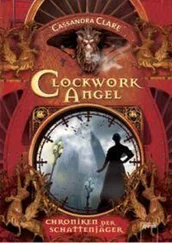There are women by the river when Gris and Otthild arrive, knee-deep, but they are not washer-women—the profession is unheard of here. They splash playfully in the red-gold surf with long ladles the size of croquet mallets, scooping up the redolent water and serving it to each other. Otthild takes a ladle from the grassy park which leads into the current, one with a red and gold flecked handle, and dips it deep, offering it to him.
“My name is Gris,” he says. She tilts her head.
“Grey? How odd. I found a man in the station once called Vermillion. He was shaking and hiding his eyes in the vestibule—he wouldn’t even come out of the train. He looked up at me from the steel floor like a calf, imploring, uncomprehending. He said he came from the north, from the City of Quaint Despairing, and he could not bear to look outside the doors of the carriage. His mother had been an agoraphobe in pearl earrings, his father a claustrophobe in iron cufflinks, and between them he could hardly move for terror. His brothers had dragged him to the train, but he could do no more than huddle and quiver and hide from the light. I kissed him so many times! I let my hair fall over him, so that he was neither exposed nor shut away, and against the rocking walls of that little vestibule I wrapped my legs around his waist. He paid me in his mother’s earrings.”
Gris starts. “Are you a whore, then?”
She smiles. “What profession could remain in a city where the river makes one drunk and the trees bear cream and crust? Even still, I am not anyone’s for the taking, I am not a calf. I am not a lime or a grape. But here we are impatient with all that is not readily available, and so in the province of ease, all things are simplified. There are two occupations in the City of Blind Delight—the Station dancers and the prostitutes. I am both.”
Gris rubs his forehead and drinks from the proffered ladle. It tastes harsh and he coughs a cough of burnt grapes. “Why am I here?” His voice is so small. He cannot even now remember what sort of scotch he has at home, or how far it is from Union Station to his apartment.
“The Line must have wanted you. It has its own reasons. Like anything that lives in the earth it dreams and becomes restless, curious, even morbidly so. What would happen if this substance were added to that one, even though it says expressly not to on the label? There is a Conductor, I have heard that. Perhaps she has brass buttons on her uniform like my mother. Perhaps she has circuits on her eyelids. Perhaps she saw your blue coat and your briefcase and thought: ‘Otthild is lonely.’ Perhaps she was hungry for lime tarts and you stumbled onto her train because you could not be bothered to check the track number. You can go and wait for the evening train if you like. It makes no difference to me.”
He looks at her, and it is a look she knows. No one is hungry in the City of Blind Delight, except those who look at Otthild that way.
“I used to know a girl who looked like you.” He mumbles, looks at the girls splashing each other in the murky river. “She had your hair. She loved this old painter that no one has ever heard of, a painter obsessed with perspective who could never get it quite right, but he painted these cities, these cities like cut jewels, terrible and crisp and clear, with a woman in the corner, sometimes, full of the light of God like an afterthought.”
“Most men knew a woman who looked like me.” Otthild laughs.
“What would I have to pay, in a city without want?”
She frowns, looks at him seriously, her dark eyes fixing him to the riverbed. She opens the top three buttons of her emerald dress and takes his hand, gently, guiding it to her breast. She feels like the advertisement. “We are not without want.” She whispers. “No one is without want.”
* * *
Her house is made of brown cakes. It reminds him of the house in the fairy tale, but there are no red candies glinting in its cornices. Bricks of solid cake and barley sugar mortared in cream-icing the color of an old woman’s hair stack sedately into a small cottage, at the end of a prosperous street—but all streets are prosperous here. Her street is paved in bread. There are no doors or locks. Fat citizens lie about in the road, telling jokes about the size of their bellies. She leads him to a bed which is mercifully of the linen-and-wood variety, and lies down on her back, toes pointed downward. All around the bed are intricate boxes of gold and silver and ivory—he does not ask. She indicates the buttons on her dress, black jet with tiny engravings of peasants carrying water, and wood, and tilling fields decorating each one. Gris undoes each one carefully—her dress is a simple thing, with buttons from collar to hem. Beneath it she is as naked as the ceiling of the Station, and he thinks of the annunciation, the slender golden light penetrating the grey belly of Mary. But she is not grey, he thinks, he is, he is grey and blank, he is the Raphael of idiot features. The Line was not looking for him, how could it look for him? Perhaps it wanted the woman with the black glasses, and he only slipped by because she was burdened with her fruit and her ice.
He leans in to kiss her, but Otthild stops him, and indicates her sternum. He sees there as he had not seen before, when she was a rafter swaying high above his head, four knobs of bone. She smiles encouragingly, and he slips each one loose like buttons. Her skin opens, soft as cloth, and her bones, and her lungs, peeling back like gift-box tissue. Beneath all this is her heart, and it is golden, gleaming, bright at the bottom of her body. A good part of her blood is gold, too, flowing out from the metallic ventricles. She is terrible, and crisp, and clear, a Jacobean diagram of womanhood, her heart burning, burning, burning golden as God. Gris begins to weep, and his tears splash on its hard, glittering surface.
“I told you,” she chuckles. She does not move to fasten her chest. “There was a man a long time ago, when the City was new, and the Line had only just come through—the tracks just unfurled here, like a wet fern, and where there are tracks there eventually is a city. The edges of the railroad curl out into the valley, and drag up a town from the earth, whatever town the Conductor dreams of that day, whatever city the tracks long to see. And so there is a river of brandy, and the lime-tart trees, and roads of bread. The Line brought folk, and they stayed. There was a man with a hand of gold, being the son of a jeweler and having lost the flesh one in a factory which pounded out ice by the thousand cube load. When he left the Station and saw the river winding thick along the vale, and the roads with their brown crust, he wept, for nothing here freezes, and resolving never to leave pounded his hand into a railroad tie to honor the Line. Now the train comes to rest precisely on the golden tie, and that man, long dead, holds the City to the Line.
“My mother grew up working in the Station beside her mother and her grandmother, and she saw the tie glitter at the bottom of the tracks every day. She thought it the most beautiful of all the things in the City of Blind Delight, chiefly because it was so often hidden, down in the dark of the tunnel. She thought often of the ice-pounder whose fingers lay thus across the track, and came to love this thing in her mind which was less than a memory, and more than a dream. One night, after the train had sped down the tunnel, she crept across the platform and scrambled down to the gleaming tie. She lay down upon it, and felt it warm against her cheek. She wept for the dead man, and for a thing called ice which she had never seen. When I was born, she said I was so heavy, because of the gold, because of my father, and she polished my heart every night for me before bed.”
Читать дальше












